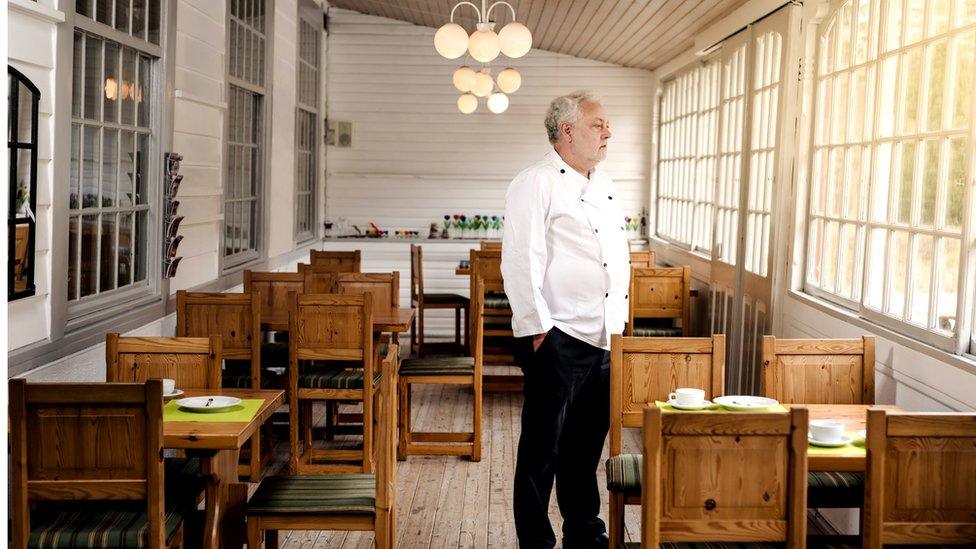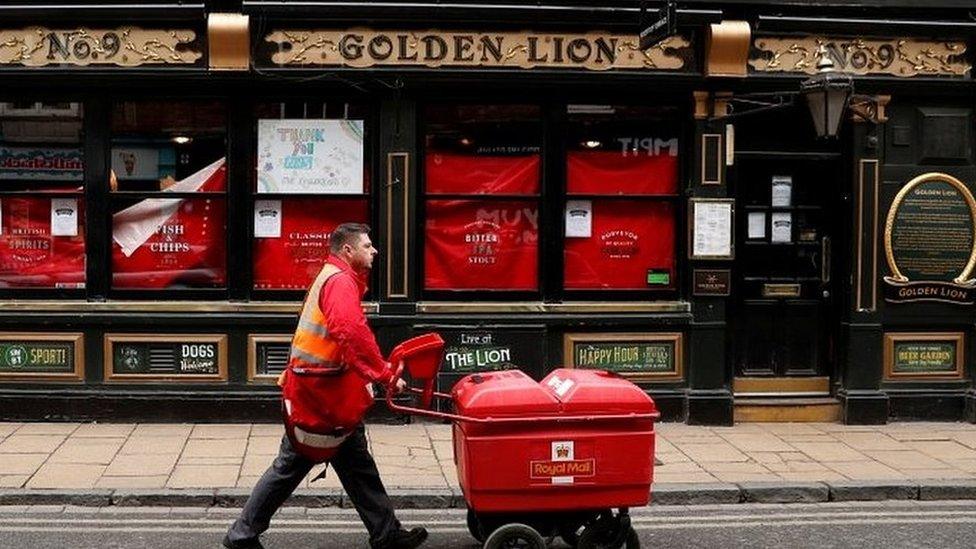Can hospitality sector adapt to long term social distancing?
- Published

Hospitality businesses will have to find a way to adapt to extended periods of social distancing
The whole point of restaurants, bars, clubs and live entertainment venues is to reduce social distance but they are uniquely hammered by continued measures, with the prospect of the shutdown continuing well into next year.
For those who work in the sector - many of them young - the question is whether to think about a complete change of direction.
If we cannot socialise in public, indoor spaces, what does it do to us as social beings?
The hospitality business is all about reducing social distance - people getting together to eat, drink and enjoy entertainment.
That is the point of it. And that's exactly what we're not being allowed to do, probably into next year.
The pathway to recovery, as set out by the Scottish government, looks like a long and potentially bumpy road, particularly for hospitality.
It tells business leaders it will try to support them, but it's also up to business to adapt to changes in markets, and to redesign workplaces to fit in with social distancing requirements.
That is a big ask of offices, where one calculation is that only 40% of office workers will be able to return to work, if they are to fit with the constraints of social distance and avoid hot-desking.

It's thought only 40% of workers will be able to return to offices
For restaurants, bars, clubs, concert venues, theatres and cinemas, it's hard to see how they could comply with the rules of social distancing, and still have enough customers to make each business viable.
Christmas 2021
These firms are burning through cash. The majority have less than three months before they run out. The vast majority have less than six months.
That time horizon can be extended by government support, but that doesn't pay for fixed costs. And the longer the lockdown or disruption to business, the harder it is for companies to rebuild.
The most likely timing for a new vaccine to be ready is the second half of next year. That makes it a serious prospect that the next time you have a meal with friends, family or colleagues could be to celebrate Christmas of next year.
Industry body UK Hospitality said on Thursday that there could be a million job losses if governments (it mainly had the UK one in mind) don't plan adequately. Planning for necessary equipment has not been a feature of the crisis so far.
So the lobby group has these suggestions:
Extend the furlough scheme beyond the end of June, at least for hospitality.
Legislative intervention to reduce demands for rent payment (the UK has gone some way towards that today, with measures to stop aggressive rent collection).
Improved access to capital with help from government through banks.
Tax incentives and government spending aimed at stimulation of demand as we emerge from crisis.
Overhaul business regulation.
Guaranteeing "a functioning and responsive insurance market".
Scarring effects
What about the workers? Will government support be sufficient to sustain the needs and hopes of all the people who work in the sector?
In this week's State of the Economy report by the chief economist at the Scottish government, he pointed out that they are disproportionately aged under 25.
That's the age at which a recession has previously been shown to have the maximum "scarring" effect on future job prospects. If you don't make a good start, it can still have effects on work stability and earnings many decades later.

Under 25s will experience the greatest "scarring" from the crisis and its economic impact
There is a comment in the Scottish government's Pathway to Recovery document that it is government's role to support people into changes that will take place in the labour market as we come out of this.
So the question for such workers is whether they need to look to new roles with new skills in different sectors, rather than wait and hope, perhaps well into next year, to get their old roles back.
Relationships
Apart from the workers and those running businesses, there's another important group affected by the nightmare facing the hospitality industry - us, the customers.
If we can't meet friends in a restaurant or bar, see live entertainment or live sport, and for that to remain the case for nine months, a year, perhaps 18 months until there's a vaccine available, what does that do to us?
This is not a financial calculation. It's about our sense of ourselves: our social lives as social beings: and the quality of our relationships with other people.
- Published22 April 2020

